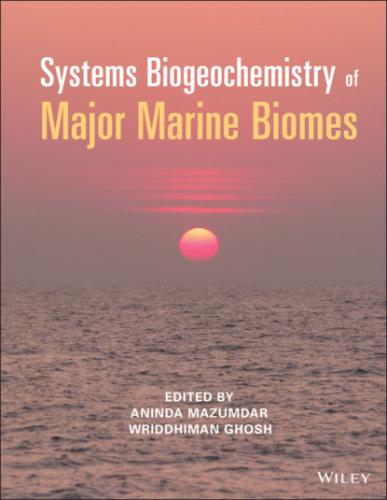147 Raiswell, R. and Berner, R.A. (1985). Pyrite formation in euxinic and semi‐euxinic sediments. American Journal of Science 285 (8): 710–724. https://doi.org/10.2475/ajs.285.8.710
148 Raiswell, R. and Canfield, D.E. (2012). The iron biogeochemical cycle past and present. Geochemical Perspectives 1 (1): 1–2. https://doi.org/10.7185/geochempersp.1.1
149 Rao, A.M.F., Malkin, S.Y., Hidalgo‐Martinez, S. et al. (2016). The impact of electrogenic sulfide oxidation on elemental cycling and solute fluxes in coastal sediment. Geochimica et Cosmochimica Acta 172: 265–286. https://doi.org/10.1016/j.gca.2015.09.014
150 Rasiq, K.T., Kurian, S., Karapurkar, S.G. et al. (2016). Sedimentary pigments and nature of organic matter within the oxygen minimum zone (OMZ) of the Eastern Arabian Sea (Indian margin). Estuarine, Coastal and Shelf Science 176: 91–101. https://doi.org/10.1016/j.gca.2015.09.014
151 Reeburgh, W.S. (1980). Anaerobic methane oxidation: rate depth distributions in Skan Bay sediments. Earth and Planetary Science Letters 47 (3): 345–352. https://doi.org/10.1016/0012‐821X (80)90021‐7
152 Regaudie‐de‐Gioux, A. and Duarte, C.M. (2012). Temperature dependence of planktonic metabolism in the ocean. Global Biogeochemical Cycles 26 (1). https://doi.org/10.1029/2010GB003907
153 Reimers, C.E. (2007). Applications of microelectrodes to problems in chemical oceanography. Chemical Reviews 107 (2): 590–600. https://doi.org/10.1021/cr050363n
154 Revsbech, N.P., Larsen, L.H., Gundersen, J. et al. (2009). Determination of ultra‐low oxygen concentrations in oxygen minimum zones by the STOX sensor, Limnology and Oceanography Methods 7: 371–381. https://doi.org/10.4319/lom.2009.7.371
155 Riedinger, N., Brunner, B., Krastel, S., et al. (2017). Sulfur cycling in an iron oxide‐dominated, dynamic marine depositional system: the Argentine continental margin. Frontiers in Earth Science, 5, 33. https://doi.org/10.3389/feart.2017.00033
156 Rixen, T., Cowie, G., Gaye, B., et al. (2020). Present past and future of the OMZ in the northern Indian Ocean. Biogeoscience Discussions 10. https://doi.org/10.5194/bg‐2020‐82
157 Ruvalcaba Baroni, I., Palastanga, V. and Slomp, C.P. (2020). Enhanced organic carbon burial in sediments of oxygen minimum zones upon ocean deoxygenation. Frontiers in Marine Science, 6, 839. https://doi.org/10.3389/fmars.2019.00839
158 Sarma, V.V.S.S. and UdayaBhaskar, T.V.S. (2018). Ventilation of oxygen to oxygen minimum zone due to anticyclonic eddies in the Bay of Bengal. Journal of Geophysical Research: Biogeosciences 123 (7): 2145–2153. https://doi.org/10.1029/2018JG004447
159 Sarma, V., Jagadeesan, L., Dalabehera, H. et al. (2018). Role of eddies on intensity of oxygen minimum zone in the Bay of Bengal. Continental Shelf Research 168: 48–53. https://doi.org/10.1016/j.csr.2018.09.008
160 Sarma, V.V.S.S., Bhaskar, T.U., Kumar, J.P. et al. (2020). Potential mechanisms responsible for occurrence of core oxygen minimum zone in the north‐eastern Arabian Sea. Deep Sea Research Part I: Oceanographic Research Papers 165: 103393. https://doi.org/10.1016/j.dsr.2020.103393
161 Schenau, S.J., Passier, H.F., Reichart, G.J. et al. (2002). Sedimentary pyrite formation in the Arabian Sea. Marine Geology 185 (3–4): 393–402. https://doi.org/10.1016/S0025‐3227 (02)00183‐4
162 Schimmelmann, A., Lange, C.B., Schieber, J. et al. (2016). Varves in marine sediments: a review. Earth‐Science Reviews 159: 215–246. https://doi.org/10.1016/j.earscirev.2016.04.009
163 Schmaljohann, R., Drews, M., Walter, S. et al. (2001). Oxygen‐minimum zone sediments in the northeastern Arabian Sea off Pakistan: a habitat for the bacterium Thioploca. Marine Ecology Progress Series 211: 27–42. https://doi.org/10.3354/meps211027
164 Schmidt, H., Czeschel, R. and Visbeck, M. (2020a). Seasonal variability of the circulation in the Arabian Sea at intermediate depth and its link to the Oxygen Minimum Zone. Ocean Science Discussions 1–31. https://doi.org/10.5194/os‐2020‐9.
165 Schmidt, H., Czeschel, R. and Visbeck, M. (2020b). Seasonal variability of the Arabian Sea intermediate circulation and its impact on seasonal changes of the upper oxygen minimum zone. Ocean Science 16 (6): 1459–1474. https://doi.org/10.5194/os‐16‐1459‐2020
166 Schmidtko, S., Stramma, L. and Visbeck, M. (2017). Decline in global oceanic oxygen content during the past five decades. Nature 542 (7641): 335–339. https://doi.org/10.1038/nature21399
167 Schott, F.A. and McCrearyJr, J.P. (2001). The monsoon circulation of the Indian Ocean. Progress in Oceanography 51 (1): 1–123. https://doi.org/10.1016/S0079‐6611 (01)00083‐0
168 Schulz, H.N., Brinkhoff, T., Ferdelman, T.G. et al. (1999). Dense populations of a giant sulfur bacterium in Namibian shelf sediments. Science 284 (5413): 493–495. https://doi.org/10.1126/science.284.5413.493
169 Schunck, H., Lavik, G., Desai, D.K. et al. (2013). Giant hydrogen sulfide plume in the oxygen minimum zone off Peru supports chemolithoautotrophy. PloS One 8 (8): p.e68661. https://doi.org/10.1371/journal. pone.0068661
170 Seitaj, D., Schauer, R., Sulu‐Gambari, F. et al. (2015). Cable bacteria generate a firewall against euxinia in seasonally hypoxic basins. Proceedings of the National Academy of Sciences 112 (43): 13278–13283. https://doi.org/10.1073/pnas.1510152112
171 Seiter, K., Hensen, C., Schröter, J. et al. (2004). Organic carbon content in surface sediments – defining regional provinces. Deep‐Sea Research Part I 51: 2001–2026. https://doi.org/10.1016/j.dsr.2004.06.014
172 Seiter, K., Hensen, C. and Zabel, M. (2005). Benthic carbon mineralization on a global scale. Global Biogeochemical Cycles 19: 1–26. https://doi.org/10.1029/2004GB002225
173 Sellanes, J. and Neira, C. (2006). ENSO as a natural experiment to understand environmental control of meiofaunal community structure. Marine Ecology 27 (1): 31–43. https://doi.org/10.1111/j.1439‐0485.2005.0006
174 Sengupta, D., Bharath Raj, G.N. and Shenoi, S.S.C. (2006). Surface freshwater from Bay of Bengal runoff and Indonesian throughflow
